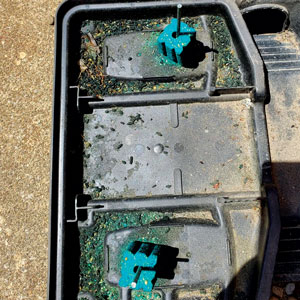
Clean those dirty bait stations; the mice won’t mind. PHOTO: MARK SHEPERDIGIAN, BCE
Editor’s Note: The “Question of the Month” in our February issue (p. 10) inspired Shep, an Editorial Advisory Board member, to not only provide an answer for the page but to expound on the truth behind another myth.
A common thought is that not all the droppings should be cleaned out of traps or bait stations because they’ll attract more mice. It sounds reasonable, but does it hold up to a closer look?
It’s well known that house mice (Mus musculus) are very attuned to the smells from urine and droppings. Unfortunately, if you’re not a mouse, you won’t know what messages they carry. There’s no question that traps that have seen activity are “seasoned” and seem to be more effective, but whether mouse droppings in a bait station cause more mice to eat the bait is a separate issue.
Mice leave urine and droppings wherever they go, but what information do they carry? What other mice are eating is only one possibility. Mice learn much about the previous mice, including their sex, age and social status. They’ll know whether it was a female and if she was receptive or pregnant. If it was a male, they will know whether he is dominant or subordinate.
All this information is useful, but not all of it will induce a mouse to stick around and enjoy a meal. If the previous mouse was a dominant male, this may be reason to leave quietly — or not even enter the bait station at all.
Passing the sniff test
Although some of the messages sent via odor may be negative, overall, they probably help more than they hurt. Plus, considering how sensitive mice are to odors, removing the droppings isn’t going to render a bait station odorless. There are still dried residues of urine and droppings giving off odors, even if you can’t see them.
These odors will linger for a while, but they will diminish over time. In areas of regular activity, the odors will constantly be added to by subsequent mice.

Mark Sheperdigian
Droppings, meanwhile, indicate activity. It will be more valuable for you to know what has happened since your last visit. And don’t forget, the competition and auditors will point to droppings left in devices as an indicator of poor service.
Staying safe
After all of that, in addition to odors, droppings and urine can carry pathogens. It is important to treat “seasoned” devices with both respect and gloved hands. For exterior bait stations, the inhalation hazard will be low even though pathogens may be present. If you are inside a confined space with heavy rodent activity, you should be wearing a respirator fitted with a high-efficiency particulate air (HEPA) filter. Inhaling the dust from dried urine and droppings can lead to lymphocytic choriomeningitis (LCMV), leptospirosis, hantavirus pulmonary syndrome (HPS), and other diseases. Once removed from the account, consider decontaminating devices that have been exposed to mouse activity.
To reiterate: Odors left by previous mice can be helpful, but droppings should be cleaned out. Doing so will indicate good service and reduce the potential for contamination, and the mice will still know who came before them.
Leave A Comment